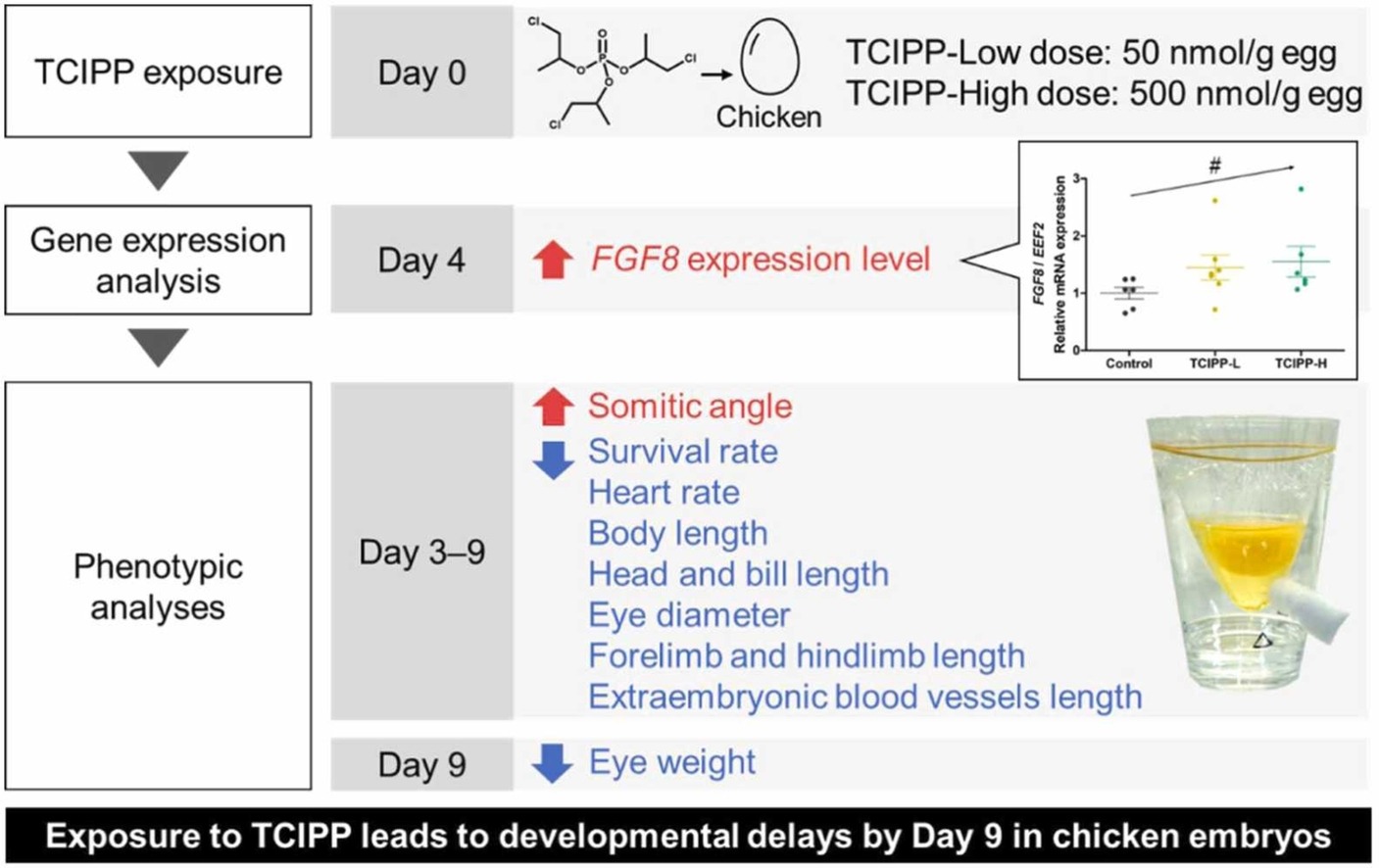Organophosphorus flame retardants induce malformations in avian embryos
Evaluation of developmental toxicity in early chicken embryos exposed to tris(2-chloroisopropyl) phosphate
Tris (2-chloroisopropyl) phosphate (TCIPP) is an organophosphorus flame retardant found in the environment. Little is known about the toxic effects of TCIPP in birds. In this study, a shell-less incubation system was applied to investigate TCIPP toxicity in early chicken embryos. TCIPP exposure caused decreased survival, growth inhibition, vascular elongation inhibition and decreased red blood cell production, decreased heart rate, and abnormal somite formation. These results suggest that TCIPP exposure is toxic to avian embryo development.
Tris(2-chloroisopropyl) phosphate (TCIPP) is one of the organophosphorus flame retardants that has been detected in the environment, and in the eggs, feathers, and liver of birds. Early developmental avian embryos are known to be sensitive to chemical exposure, but knowledge regarding the effects of TCIPP on avian embryonic development is limited. In this study, a shell-less embryo incubation system was used to investigate the toxicity of TCIPP in early chicken (Gallus gallus domesticus) embryos.
Fertilized chick embryos were exposed to 50 nmol TCIPP/g, 500 nmol TCIPP/g, or vehicle control, dimethyl sulfoxide (DMSO) on day 0 of incubation. Embryos were observed on days 3-9 of incubation, and expression levels of several genes were measured in embryos on day 4.
Survival was significantly reduced in both groups exposed to TCIPP. Imaging analysis showed that body length, head and bill length, eye diameter, and forelimb and hindlimb length were significantly reduced in both groups exposed to TCIPP. In addition, TCIPP exposure significantly inhibited extraembryonic vascular length and red blood cell production. The heart rate decreased in a dose-dependent manner, particularly on days 4-7, and the somitic angle was significantly increased on days 4-6 in the TCIPP-exposed group, inducing asymmetrical somite formation. The significant correlation between somitic angle and FGF8 expression suggested that TCIPP exposure affects somite formation through an altered FGF signaling pathway.
These results indicate that TCIPP exposure exerts toxic effects on development, including vascularization, cardiac function, and somite formation in avian embryos.
Reference URL: https://doi.org/10.1016/j.ecoenv.2023.115445
Bibliographic Information
Developmental toxicity in early chicken embryos on exposure to an organophosphorus flame retardant, tris(2-chloroisopropyl) phosphate
Kaori Chigusa, Kazuki Kanda, Hisato Iwata, Ecotoxicology and Environmental Safety, 264, 115445, 1 October 2023, https://doi.org/10.1016/j.ecoenv.2023.115445
Fundings
- Japan Society for the Promotion of Science (JSPS) KAKENHI: Scientific Research (S) [No. 26220103] and Challenging Research (Exploratory) [No. 19K22912]
- Ministry of Education, Culture, Sports, Science, and Technology, Japan (MEXT): the Joint Usage/Research Center – Leading Academia in Marine and Environment Pollution Research (LaMer)
Media
-

Chigusa et al Graphic Abstract
Summary of developmental toxicity of early chicken embryos exposed to tris(2-chloroisopropyl) phosphate using a shell-less embryo incubation system
credit : Center for Marine Environmental Studies (CMES), Ehime University
Usage Restriction : Please get copyright permission
Contact Person
Name : Hisato Iwata
Phone : +81-89-927-8172
E-mail : iwata.hisato.mz@ehime-u.ac.jp
Affiliation : Center for Marine Environmental Studies

